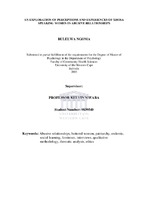| dc.contributor.advisor | Mwaba, Kelvin | |
| dc.contributor.author | Ngoma, Bulelwa | |
| dc.contributor.other | Dept. of Psychology | |
| dc.contributor.other | Faculty of Community and Health Sciences | |
| dc.date.accessioned | 2013-08-27T12:38:41Z | |
| dc.date.available | 2007/06/25 07:19 | |
| dc.date.available | 2007/06/25 | |
| dc.date.available | 2013-08-27T12:38:41Z | |
| dc.date.issued | 2005 | |
| dc.identifier.uri | http://hdl.handle.net/11394/1987 | |
| dc.description | Magister Psychologiae - MPsych | en_US |
| dc.description.abstract | The problem of abusive relationships has attracted national attention in South Africa. Historically South Africa has a strongly entrenched patriarchal system, which gives men proprietary rights over women. Traditional and cultural values as means of resolving conflict are critical in shaping and perpetuating violence of men toward women. A woman’s social status is believed to be derived by her relative position to a man that is as daughter, wife, girlfriend or mother of his children. One solution to ending the abuse and leading violence free lives would be to leave the relationship. While this is a possible solution it should be noted that in order for women to leave it requires enormous restructuring of material, physical and social relations. A qualitative feminist research methodology was used with a convenience sample of 8 women who agreed to participate in the study. In depth interviews were conducted with the participants to explore the perceptions and experiences of Xhosa women in abusive relationships. The participants resided in Khayelitsha, Phillipi and Langa. The interviews lasted from 30 minutes to 45 minutes, were audio taped and transcribed. In view of the qualitative nature of the study, the researcher employed thematic analysis. Women mentioned their experiences of abuse and discussed their help seeking strategies. A number of themes that emerged from the study suggested clearly women’s perceptions and experiences to remain in their abusive relationships. These themes relate to commitment, staying because of children, cultural beliefs (lobola), economic dependence and lack of social support. It also emerged from the discussions with women that the emotional and structural support that these women received from the NGO played a huge role. The most important finding from the study was that change occurred as a result of abuse. | en_US |
| dc.language.iso | en | en_US |
| dc.publisher | University of the Western Cape | en_US |
| dc.subject | Patriarchal system | en_US |
| dc.subject | Family violence - South Africa | en_US |
| dc.title | An exploration of perceptions and experiences of Xhosa speaking women in abusive relationships | en_US |
| dc.type | Thesis | en_US |
| dc.rights.holder | University of the Western Cape | en_US |
| dc.description.country | South Africa | |

